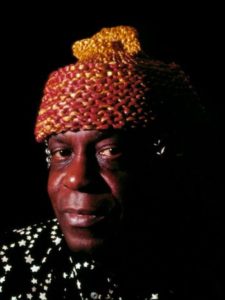
Sun Ra
*On this date in 1914, Sun Rawas was born. He was a Black jazz composer, bandleader, pianist, synthesizer player, and poet. Sun Ra was born Herman Poole Blount in Birmingham, Alabama. He was named after the popular vaudeville stage magician Black Herman, who had deeply impressed his mother. He was nicknamed "Sonny" from childhood, had an older sister and half-brother, and was doted upon by his mother and grandmother.
As a child, Blount was a skilled pianist. By 11 or 12, he was composing and sight-reading music. Birmingham was an essential stop for touring musicians, and he saw prominent musicians such as Fletcher Henderson, Duke Ellington, Fats Waller, and others. In his teenage years, he attended big band performances and produced complete transcriptions of the bands' songs from memory. By his mid-teens, Blount was performing semi-professionally as a solo pianist or as a member of various ad hoc jazz and R&B groups. He attended Birmingham's segregated Industrial High School (now known as Parker High School), where he studied under music teacher John T. "Fess" Whatley.
Though deeply spiritual, his family was not formally associated with any Christian church or sect. Blount had few or no close friends in high school but was remembered as kind-natured and quiet, an honor roll student, and a voracious reader. He took advantage of the Black Masonic Lodge, one of the few places in Birmingham where African Americans had unlimited access to books. Its collection of Freemasonry and other esoteric concepts made a strong impression on him. By his teens, Blount suffered from cryptorchidism. It left him with a constant discomfort that sometimes flared into severe pain. Blount became involved in the Chicago jazz scene during the late 1940s.
He soon abandoned his birth name, taking Le Sony'r Ra, shortened to Sun Ra, the Egyptian God of the Sun. He developed a complex persona and an idiosyncratic, myth-based credo that would make him a pioneer of Afrofuturism. He claimed to be an alien from Saturn on a mission to preach peace; throughout his life, he publicly denied ties to his prior identity. Very little was known about Sun Ra's early life for decades, and he contributed to its mystique. As a self-invented person, he speculated, only half in jest, that he was distantly related to Elijah Muhammad, leader of the Nation of Islam.
His eclectic and avant-garde music echoed the entire history of jazz, from ragtime and early New Orleans hot jazz to swing music, bebop, free jazz, and fusion. His compositions ranged from keyboard solos to works for big bands of over 30 musicians, as well as electronic excursions, songs, chants, percussion pieces, and anthems. From the mid-1950s until his death, Ra led the musical collective The Arkestra (which featured many artists throughout its various iterations). Its performances often included dancers and musicians dressed in elaborate, futuristic costumes inspired by ancient Egyptian attire and the Space Age. Though his mainstream success was limited, Sun Ra was a prolific recording artist and frequent live performer, and he remained influential throughout his life in terms of his music and persona.
He is widely regarded as an innovator; among his notable achievements are his pioneering work in free improvisation and modal jazz, as well as his early adoption of electronic keyboards and synthesizers. He was known for his experimental music, "cosmic" philosophy, prolific output, and theatrical performances. Throughout his career, he recorded dozens of singles and over 100 full-length albums, comprising more than 1,000 songs, making him one of the most prolific recording artists of the 20th century. (Following Ra's illness-forced retirement in 1992, the band remained active as The Sun Ra Arkestra and, as of 2018, continues performing under the leadership of veteran Ra sideman Marshall Allen.) He often inspired Afrofuturism writers, and Sun Ra died on May 30, 1993.